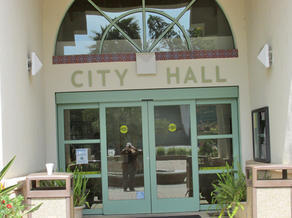Part one of two.
The Avalon council this week discussed a proposed agreement with the Catalina Island Conservancy concerning the mule deer. Staff sought council direction on the proposal.
However, following mostly negative comments from many members of the public, the council reached a consensus that they would take no action. The meeting lasted three hours.
According to City Attorney Scott Campbell, this was a discussion item. No vote was required.
The council also looked at a proposed amendment to the Municipal Code that would allow the Conservancy to capture and sterilize deer within the city’s limits. Under the proposal, the deer would be allowed to live out their lives on the Island, even if they left Avalon. The council took no action on the ordinance.
According to the city manager’s staff report, the agreement would include one last deer hunting season on Catalina Island.
Due to space limits this is the first of two parts. Details on public and council comments will appear in next week’s paper.
Responses to results
The Islander requested comments on the results of the council meeting from both the Coalition to Save Catalina Island Deer snd the Catalina Island Conservancy.
The Coaltion’s statement was:
“On Friday afternoon, 4/5, the Coalition was informed of the City’s negotiations with the Catalina Island Conservancy and planned action for the 4/9 Avalon City Council meeting regarding our mule deer. With very little notice or time to prepare, we galvanized and showed up, once again, to let the council know that this deal was no deal at all. First, the California Department of Fish and Wildlife has not granted the Conservancy’s scientific collecting permit application. The Conservancy simply cannot make promises to do or refrain from doing anything with the Island’s mule deer that the State has not yet given them authority to make. Second, The Coalition’s position is clear. We vehemently challenge the Conservancy’s entirely unsubstantiated contention that the Island’s ecosystem cannot support a managed herd of mule deer. Any compromise that concedes that contention is premature and simply unacceptable. Until the Conservancy can show peer-reviewed scientific evidence that deer on our Island are devastating our ecosystem, they cannot be permitted to conduct the brutal and inhumane slaughter they have proposed. We are very grateful to the City Manager for his considerable efforts to find a path forward that might be acceptable to all parties involved. We are also extremely grateful to our local government representatives for staying this burdensome course with us in the face of tremendous pressure.”
The Conservancy’s statement was:
“We’re disappointed,” said Catalina Island Conservancy President and CEO Whitney Latorre. “After working hard to ensure that we heard the concerns of the community and working with the city on modifications and compromises that spoke to those concerns, we were told by the opposing coalition at the council meeting that the community was no longer interested in a final hunt or a sterilization program to allow some deer to live out their lives. We will continue to provide information to the California Department of Fish and Wildlife to obtain the necessary permit to ensure a safe and resilient island for generations to come.”
Background
“The Catalina Island Conservancy (‘Conservancy’) submitted a Scientific Collection Permit Application (‘Permit’) to the California Department of Fish and Wildlife (CDFW) on or about August 7, 2023 as part of the Conservancy’s Island Restoration Project,” wrote City Manager David Maistros.
“The Permit proposes to eradicate all of the mule deer on Catalina Island beginning approximately August 2024. The original application proposes to eradicate the deer by way of aerial shooting. Additionally, the Permit proposes capturing and/or hunting deer within City limits,” Maistros wrote.
Though not mentioned in Maistros’ report, the Conservancy has argued that the mule deer pose a threat to the Island’s ecosystem. Island residents have questioned the validity of that argument.
“After thorough consideration of the residents’ concerns, on November 7, 2023, City Council amended the Avalon Municipal Code to more specifically address, strengthen protections, and prohibit hunting, trapping, feeding, luring, inhumane treatment, and killing of wild animals — including deer — within the City of Avalon,” Maistros wrote.
“In revising and clarifying the Municipal Code, City Council determined that hunting, pursuing, feeding, killing, or trapping animals within the City represents a threat to public health, safety, and welfare to the residents and visitors within the City of Avalon,” Maistros wrote.
“The Conservancy and CDFW have cautioned the City that the ordinance may be subject to scrutiny as being in conflict with the jurisdiction of the CDFW regarding animal management and control,” Maistros wrote.
“Since January, the Conservancy has conducted a number of forums in an effort to engage the public regarding the Island Restoration Project,” Maistros wrote.
“Much of the public opposition focuses on a few central themes. 1. Proposed Methodology – there is strong opposition to the use of helicopters as the primary method of eradicating the deer; 2. Timing – Initiating the plan in August during the peak of the tourist season increases the risk of injury and negative economic impact from lost tourism revenues; 3. Resistance to incorporate hunting as part of the methodology; 4. Not recognizing deer as part of the fabric and history of the Island
“The Conservancy has acknowledged a willingness to address some of the concerns of the residents while also staying true to the science behind the original Restoration Plan. As a direct result of these negotiations, the Conservancy would agree to amend the implementation of the Island Restoration Project should CDFW grant the pending Permit Application as follows,” Maistros wrote.
“The Conservancy will support a final hunting season from July-December 2024. The Conservancy will petition the Fish and Game Commission to increase the number of tags issued from 500 to at least 700 for the 2024 hunting season in order to incorporate the use of hunters. Additionally, this ‘Last Hunt’ will be further supported by the Conservancy’s commitment to remove the financial burden for local hunters by subsidizing the cost for all Catalina Island residents,” Maistros wrote.
“In order to preserve deer on the Island and recognizing that a certain number of deer are found in the City of Avalon, the Conservancy agrees to humanely capture, sterilize and identify by tagging healthy deer located within the City of Avalon. The ultimate number of tagged deer will be more fully determined and mutually agreed upon at the time of the identification and sterilization procedure,” Maistros wrote.
“The City will be entitled to have a veterinarian (or similarly credentialed professional) observe and document the sterilization and tagging process,” Maistros wrote.
“The ‘tagged’ deer will be protected and remain unharmed throughout the completion of the Restoration Project. It is understood that ‘tagged’ deer will not be hunted or intentionally harmed in any way during the remainder of the deer’s lives,” Maistros wrote.
“Tagged deer will be free to live out their lives whether they remain within City limits or migrate onto Conservancy or private property,” Maistros wrote.
“The City will amend the existing ordinance to permit the capture of deer for the purpose of sterilization within City limits and to not be in conflict with state and wildlife laws,” Maistros wrote.
“As a direct result of the more robust final hunting season and the protection of the tagged deer, the number of deer that could be subject to aerial removal will be significantly reduced,” Maistros wrote.
“The Conservancy agrees to not conduct any aerial-based deer removal operations during the months of June through September and the earliest such action can occur is 2025,” Maistros wrote.
“The Conservancy would further agree that they will not incorporate ‘netting and bolting’ as a means to implement Island Restoration Project,” Maistros wrote.
“The Conservancy and City acknowledge that the foregoing only allows for an amendment to the implementation of the pending Permit Application and the ultimate decision to grant, deny or further amend the permit application rests solely with CDFW,” Maistros wrote.
“Should CDFW approve the plan as currently submitted, the Conservancy would agree to abide by the terms set forth herein and incorporated in the MOU if approved. If CDFW denies the Permit Application the MOU will become null and void,” Maistros wrote.











